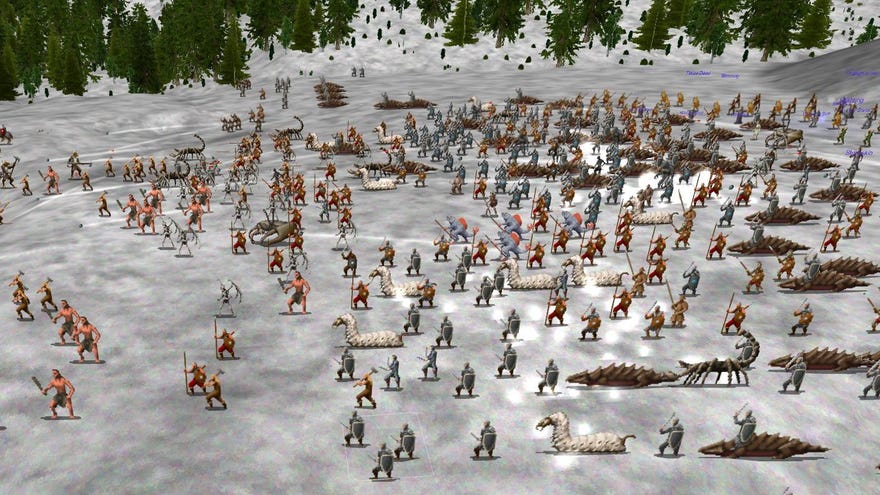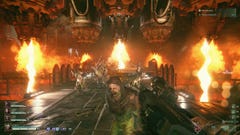The Rally Point: It's about time we did Dominions 3,4,5, and probably 6
Return Pretender
Dominions is a series where you can build the Ark Of The Covenant, which blinds everyone on any battlefield it appears on. Games where any soldier can receive a horror mark, which attracts unspeakable phantoms from beyond reality to randomly attack them, and if they survive, they'll probably receive more horror marks. Games where I once deployed my entire military against an evil raven so large and powerful that I lost, leaving behind corpses that it fed on to grow even stronger. Games where a frog could, mathematically, kill god with one blow.
Dominions 6 is due out in January, bringing with it changes so esoteric that I'd be better off talking about Dominions 3 to Dominions 5 instead. So let's do that.
The first thing to concede is that they're all very similar (though I've not played the first two). I mean that not as a dig, but to establish that if you fundamentally dislike a Dominions, you'll almost certainly dislike them all. They are iterative sequels through and through, aiming to perfect, improve, and gradually expand rather than radically experiment or dive into total reinvention.
Each is essentially a wargame. Although unofficial diplomacy is common in multiplayer, and there are co-op options, this is about gods contesting a single title. Any alliance inevitably falls as in the end, there can be only one.
You compete by raising armies, unit by unit, shoving them in front of a commander, and then sending those commanders around the world, province by province. Movement is straightforward, with most armies only able to move one or two provinces in a turn, and blocked by ocean and non-friendly territory unless every unit has certain innate or acquired powers. Territory generates money for central coffers, and resources for local use, which mostly goes back into buying more troops. Turns happen simultaneously, so you need to anticipate where the enemy will move next. This raises the value of stealthy armies, and of encirclement, raiding, and probing attacks to disrupt economies and divide forces.
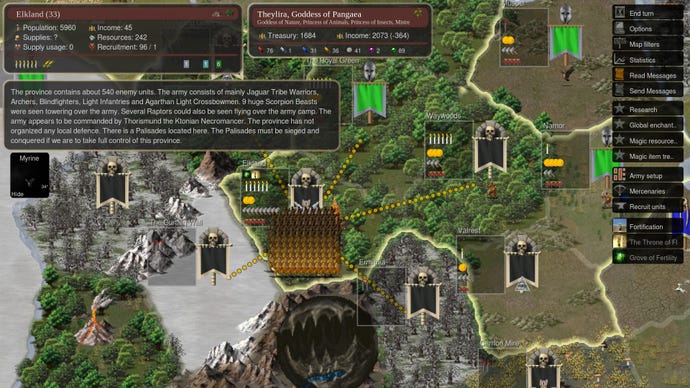
The second-guessing is a huge part of the game. It could also get overwhelming, but committing your armies and mages to the right actions is where most of a turn goes, as battles are a spectator sport. A tiny bit like Mech Engineer, your job isn't to swing every sword, but to organise and prepare your people right. When hostile armies meet, you only watch a replay of what they did, in an incredibly low-fi fashion with sprites and minimal animation. It's... remarkably charming, honestly, helped along by the sheer variety of units and weapons, and that strange satisfaction of seeing every single little guy you've recruited do their thing.
Much of your game is decided based on your first choices. To start, you design a god, starting with one of dozens of chassis, then defining their powers. Your god could be a giant golden buddha-like creature, or a fountain of blood, or a weird little guy riding a demon-monkey thing, or a decrepit old crone. Or a rock.
Each comes with innate statistics, traits, and access to particular magic paths (fire, air, death, etc.), a tradeoff of pros, cons, and leftover points to put into other things. The rock, for example, is hardy but immobile, while the crone could be taken out by a sudden sneeze, but she's cheap. Spare points can buy access to stronger or broader magic, or more powerful dominion effects. The latter is your god's tangible power in the world, and spreads by several means, empowering your troops and often physically altering the world as it goes. It might make the world hotter, or more unlucky, or more fertile, all of which can matter. You could also invest in a "bless" strategy, which grants a sort of package deal of custom spell effects to a select few unit types, provided a good enough priest is around.
But even before this, you'll have chosen a nation (faction), which are split across three siloed ages of the world. Some nations are present in each age, but drastically warped over time, or splintered or assimilated into others. And as with your choice of god, each offers unique advantages and weaknesses, and moreover, flavour.
Dominions is an exceedingly rare fantasy series that looks beyond the usual tired sources for inspiration, instead basing its nations on a huge array of real-world mythologies. Utterly ignored cultures and stories like Sarmatia, Nazca, Lanka, Phoenicia, are all represented, then twisted and warped to suit a world entirely about war and terrible magic. Your people could be cannibalistic amazons, demon-led bakemono, corpses animated by angry forest vines, or Ramayana-inspired monkey hordes.
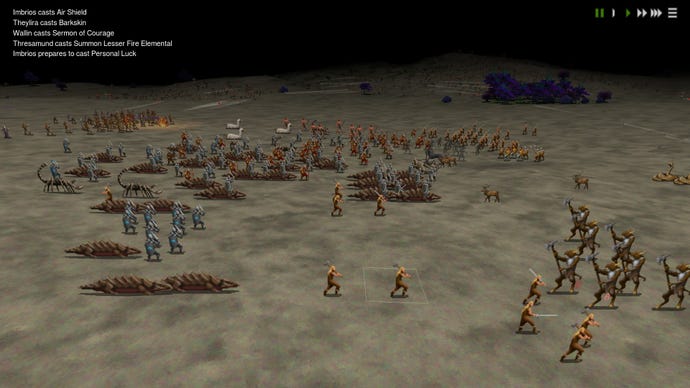
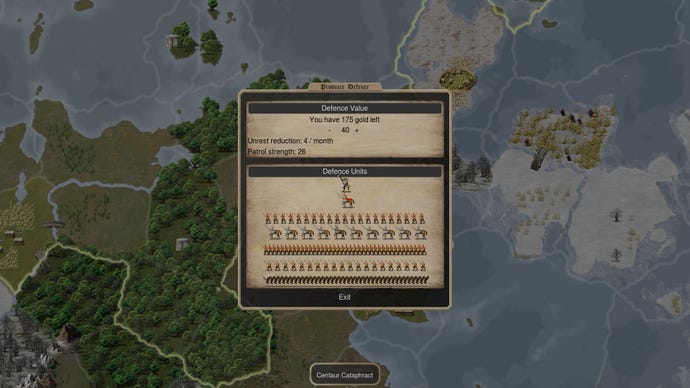
Each nation offers unique units, and pairs better with some forms of magic, some types of god, and some dominion effects. The wacky bake Shinuyama hordes are a good fit for a god who spreads chaos and luck, while the "vengeful forest" Asphodel thrive in a dominion that increases both growth and death, creating more living things to kill and reanimate. You might lead with hoplites while mages summon waves of undead, or your god itself as a giant snake crushing and terrifying entire armies.
Then there's the magic itself, which, oh man. I've only got so many words. Dominions is one of the few games that really gets into how terrifying magic should be. Your average soldier in this world will face spells that fill your lungs with water, rain blood, summon lights that permanently age you, break all your bones, or cast you into some nightmare dimension. Mages can create items too, so even any random old man might have a spear that Scorpions you through the void into his reach. A commander might get something nice, like a pocket toy that turns into a friendly knight, or a robe that makes you pretty. But soldiers are more likely to get cursed because they stood near their boss while his talking skull was in a bad mood, or fall afoul of The Sickle Whose Crop Is Pain. That's if a spell outside of battle doesn't lobotomise your whole province, abduct the sun, or decide you're the next target of The Kindly Ones. Even a farmer might wind up within a dominion that kills everything, and god help you if you're a virgin, sure to be rounded up and sacrificed by the hundred to power some blood mage's nightmare.
Each spell is cast by a unit, rather than by some unseen infrastructure of the player. This takes them away from doing other things, like researching or improving themselves, or searching for more of the sites that produce the gems that power most spells. Each spell requires a caster with a high enough skill level in a path (or several), and a nation that's researched the appropriate school, and in some cases, casters can network their talents to multiply power.
Setting that up, though, requires knowledge of the battle scripting system. Dominions lets you give commanders a basic list of standing orders. Soldiers are simple, but mages can be instructed to cast specific spells in order. This makes for a dizzying wealth of possibilities, and it's why you'll get absolutely obliterated in open multiplayer. My personal advice is to avoid people who play to win, and instead muck around with some friends who want to do some mad shit. There's no formal diplomacy, but a lot of fun to be had playing your side as a character, sending proposals, threats, or inscrutable ravings via in-game letters. A player who's memorised a heap of stats and efficiencies will crush anyone who's not into that. Probably one based around maxing out blood magic, a famously powerful path with a dedicated school that acts as an almost limitless force multiplier with sufficient prep, but getting there takes a lot of rather tedious micromanagement.
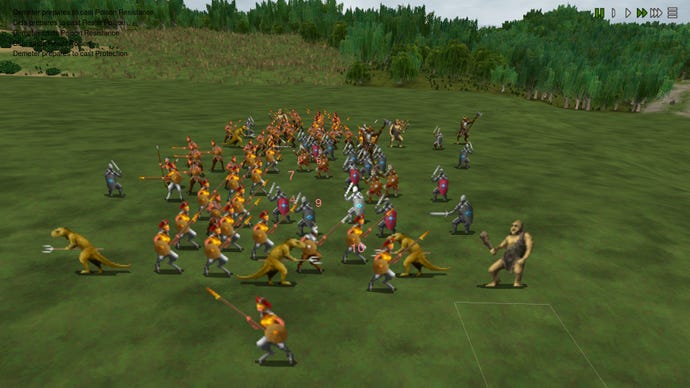
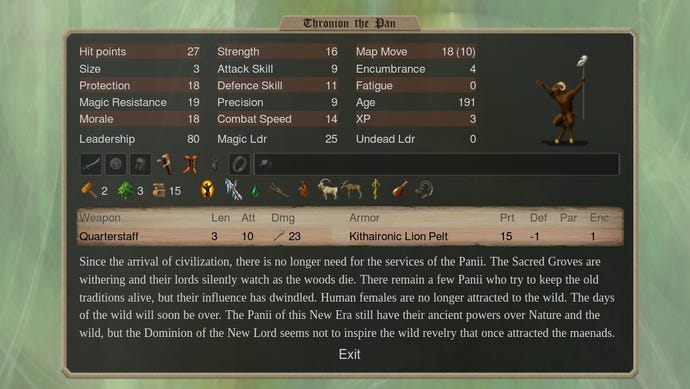

As much as Dominions can be power gamed, there's a lot about it that's tantalisingly opaque. That can be frustrating when it's not clear why, say, your berserkers got pasted by those spirits, or how to prevent your army being turned into pigs again. But for me it emphasises that it's a series about flavour, and at its best when you embrace chaos, and throw cool stuff at the wall even if it's probably not the most efficient use of gems. That variety, and those possibilities, from the ludicrously powerful to the colourfully useless and the hilariously pyrrhic, are the great appeal of the series. They're also, I surmise, why it's so iterative.
The biggest single change was probably the addition of thrones back in Dominions 4, but the diversity of the game's possibilities means even undramatic changes can be more consequential than they sound. The changelist for Dominions 6 is a plethora of small things, and even some obviously significant ones are too esoteric to get into here. The general trend, though, is towards bigger battles with more units both mundane and summoned. Illusion-themed spells, previously dotted about other paths, will be separated into their own dedicated path, and a few systems have been ported from sibling series Conquest Of Elysium, most notably a layer of caverns beneath the world. There'll be a bit more of almost everything, too, adding a couple of extra nations, spells, and so on.
It's hard to name a standout feature that I'm excited about. But I'm optimistic about the combined effect of hundreds of changes, and finally seizing the excuse to write about a series that once inspired me and several other RPS commenters (including co-contributor Caelyn Ellis) to write a diary that climbed to over 25,000 words of scheming, lamenting, joking, and taunting poems. There just aren't many strategy games that so readily feed your imagination, and while it may be gradual, the 20 years of refinement going into Dominions 6 is one of the Good Things about an independent games scene; we've room not only for off the wall ideas, but for people persistently working on their own specific thing.
It may well take a few more iterations to sand off its kinda backwards UI and steep learning curve, but I'd have recommended the series even a decade ago, and even if the worst happens and 6 drops the ball, I'd probably just shrug and insist any newcomers try the older entries anyway.
